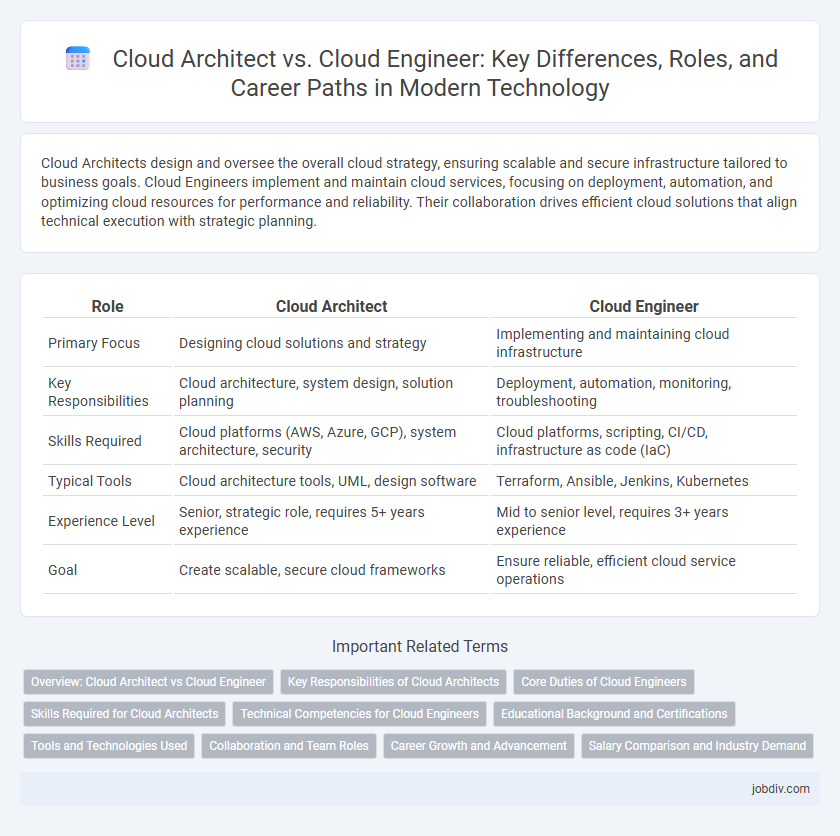Cloud Architects design and oversee the overall cloud strategy, ensuring scalable and secure infrastructure tailored to business goals. Cloud Engineers implement and maintain cloud services, focusing on deployment, automation, and optimizing cloud resources for performance and reliability. Their collaboration drives efficient cloud solutions that align technical execution with strategic planning.
Table of Comparison
| Role | Cloud Architect | Cloud Engineer |
|---|---|---|
| Primary Focus | Designing cloud solutions and strategy | Implementing and maintaining cloud infrastructure |
| Key Responsibilities | Cloud architecture, system design, solution planning | Deployment, automation, monitoring, troubleshooting |
| Skills Required | Cloud platforms (AWS, Azure, GCP), system architecture, security | Cloud platforms, scripting, CI/CD, infrastructure as code (IaC) |
| Typical Tools | Cloud architecture tools, UML, design software | Terraform, Ansible, Jenkins, Kubernetes |
| Experience Level | Senior, strategic role, requires 5+ years experience | Mid to senior level, requires 3+ years experience |
| Goal | Create scalable, secure cloud frameworks | Ensure reliable, efficient cloud service operations |
Overview: Cloud Architect vs Cloud Engineer
Cloud Architects design and oversee cloud computing strategies, focusing on infrastructure planning, deployment models, and ensuring scalability and security across cloud platforms like AWS, Azure, or Google Cloud. Cloud Engineers implement these strategies by building, managing, and maintaining cloud environments, specializing in tasks such as automation, monitoring, and troubleshooting cloud services. Both roles require expertise in cloud technologies, but Architects prioritize high-level design and strategic decision-making, while Engineers focus on hands-on technical execution and optimization.
Key Responsibilities of Cloud Architects
Cloud Architects design and implement scalable cloud solutions by creating architecture frameworks that align with business goals and technical requirements. They oversee cloud strategy, governance, and compliance to ensure secure, efficient, and cost-effective cloud infrastructure. Key responsibilities include selecting appropriate cloud services, defining integration patterns, and establishing best practices for deployment and maintenance.
Core Duties of Cloud Engineers
Cloud Engineers focus on designing, implementing, and maintaining cloud infrastructure with expertise in platforms like AWS, Azure, and Google Cloud. They manage cloud deployment, automate cloud operations using tools such as Terraform and Kubernetes, and ensure system security and scalability. Proficiencies include cloud networking, container orchestration, and continuous integration/continuous deployment (CI/CD) pipelines.
Skills Required for Cloud Architects
Cloud Architects require advanced skills in designing scalable, secure, and cost-effective cloud infrastructures using platforms like AWS, Azure, or Google Cloud. Proficiency in cloud service models (IaaS, PaaS, SaaS), infrastructure as code (IaC) tools such as Terraform or CloudFormation, and expertise in network architecture, security protocols, and compliance standards are essential. Strong knowledge of system integration, disaster recovery strategies, and cross-functional collaboration complements their ability to align cloud solutions with business objectives.
Technical Competencies for Cloud Engineers
Cloud Engineers possess in-depth technical competencies, including expertise in cloud service platforms like AWS, Azure, and Google Cloud Platform, proficiency in Infrastructure as Code tools such as Terraform and CloudFormation, and strong skills in containerization technologies like Docker and Kubernetes. They are adept at automating cloud infrastructure, managing cloud security protocols, and monitoring cloud performance to ensure scalability and reliability. Proficiency in scripting languages like Python, Bash, or PowerShell and experience with CI/CD pipelines further enhance their ability to maintain efficient cloud operations.
Educational Background and Certifications
Cloud Architects typically hold advanced degrees in computer science or information technology and possess certifications such as AWS Certified Solutions Architect or Google Professional Cloud Architect. Cloud Engineers often have a bachelor's degree in a related technical field and earn certifications like Microsoft Certified: Azure Administrator or CompTIA Cloud+. Both roles require continuous learning, but Cloud Architects emphasize strategic design skills while Cloud Engineers focus on implementation and maintenance expertise.
Tools and Technologies Used
Cloud Architects leverage tools such as AWS CloudFormation, Terraform, and Microsoft Azure DevOps for designing scalable cloud infrastructures and defining architectural frameworks. Cloud Engineers focus on hands-on implementation using Kubernetes, Docker, Jenkins, and Ansible to automate deployment, manage containers, and ensure continuous integration and delivery. Both roles require proficiency in cloud platforms like AWS, Azure, and Google Cloud but differ in their emphasis on strategic design versus operational execution.
Collaboration and Team Roles
Cloud Architects design the overall cloud strategy and infrastructure, defining system requirements and ensuring scalability, while Cloud Engineers implement and manage these architectures through coding, deployment, and maintenance. Collaboration between these roles is crucial, as Architects provide the blueprint and technical guidelines, whereas Engineers execute and optimize cloud solutions based on those frameworks. Effective teamwork enhances project success by combining strategic vision with hands-on expertise in cloud environments.
Career Growth and Advancement
Cloud Architects lead cloud strategy design and integration, positioning themselves for senior leadership roles such as Chief Cloud Officer or IT Director. Cloud Engineers focus on implementing and maintaining cloud infrastructure, offering rapid skill growth and opportunities to advance into specialized engineering or DevOps positions. Career growth for Cloud Architects often involves strategic decision-making, while Cloud Engineers gain hands-on expertise that can lead to technical leadership roles.
Salary Comparison and Industry Demand
Cloud Architects command higher salaries, often ranging from $120,000 to $160,000 annually, due to their strategic role in designing comprehensive cloud infrastructure. Cloud Engineers, with salaries typically between $90,000 and $130,000, focus on implementation and maintenance, making their skills highly sought after in industries undergoing digital transformation. The demand for both roles is surging, propelled by increasing cloud adoption, with Cloud Architects often favored in leadership positions and Cloud Engineers essential for operational execution.
Cloud Architect vs Cloud Engineer Infographic

 jobdiv.com
jobdiv.com